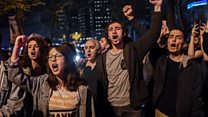
Turkey’s referendum campaign was “unequal”, with opponents suffering restrictions and state resources being misused, international monitors say.
Late changes in ballot counting marred the vote and removed a key safeguard, they added.
Turkey has called the comments biased. In the referendum, voters gave sweeping new powers to President Erdogan.
The narrow vote was ruled valid by Turkey’s electoral body, despite claims of irregularities by the opposition.
President Recep Tayyip Erdogan’s push for an executive presidency succeeded with 51.4% voting for it.
Monitors: ‘Unlevel playing field’
Image copyright
Reuters
Despite saying that the voting day was “well administered”, the Organization for Security and Co-operation in Europe (OSCE) and the Council of Europe criticised the campaign, saying:
- It was an “unlevel playing field” and the two sides of the campaign “did not have equal opportunities”
- It was unbalanced due to the active involvement of the president and several senior officials
- It was tarnished by a number of senior officials equating No supporters with terrorist sympathisers
- Administrative resources were misused
- Under the state of emergency, essential fundamental freedoms were curtailed
- Despite some measures, the legal framework remained inadequate for a genuinely democratic referendum
They also criticised a late change by electoral officials that allowed voting papers without official stamps to be counted. They said this move “removed an important safeguard and were contested by the opposition.
But the head of Turkey’s electoral body, Sadi Guven, said the unstamped ballot papers had been produced by the High Electoral Board and were valid. He said a similar procedure had been used in past elections.
Turkey reacts: Biased comments
Image copyright
Getty Images
Turkey’s foreign ministry said the remarks lacked objectivity and impartiality. “Saying the referendum fell below international standards is unacceptable,” it said in a statement.
Earlier, President Erdogan said that his side had prevailed despite what he called the attacks of the “Crusaders in the West”.
“We will march to November 2019 faster and stronger,” he said, referring to the next general election.
“But I should express again that we have much to do. We all are aware of this. Because it was a fight against everyone. The crusaders’ ideology in the West and their servants here attacked us. But we didn’t give up. We stood up as a nation.”

The main opposition Republican People’s Party (CHP) has demanded a recount of 60% of the votes. Its deputy head said the result should be annulled altogether.
The pro-Kurdish Peoples’ Democratic Party (HDP) also challenged the vote.
Right after the result, Mr Erdogan said Turkey could now hold a referendum on bringing back the death penalty – a move that would end Turkey’s EU negotiations.
Profile: Erdogan’s rise to power
Turkey referendum: Key reactions
What now? By Mark Lowen, BBC News, Ankara
Image copyright
EPA
This was a damning verdict by the observer mission.
From biased media coverage to a misuse of administrative resources by the president and government; and from restrictions on free speech to a decision to accept unstamped ballots, which “contradicted the law”; the election observers concluded that the referendum did not fulfil international standards. So what now?
It’s sure to embolden the opposition in its attempts to challenge the results. But that is an uphill struggle in a country where the state machinery is so heavily controlled by the president and his inner circle and where around 80% of the media is pro-government, pushing its interpretation of the facts.
What’s more certain is that it’ll shape the response to the referendum by European leaders and officials. They won’t rush to congratulate a victory whose legitimacy has been placed in serious doubt. And as government supporters double down, convinced of their win, the chasm between Turkey and the west shows no sign of narrowing.
Erdogan’s Turkey: The full story
Three largest cities say No
Turnout for the divisive vote was high – 85%. Mr Erdogan won in his central Anatolian heartland and on the Black Sea coast.
But he lost in the districts containing Turkey’s three largest cities.
Image copyright
Getty / EPA
In Istanbul, the largest city, and the capital, Ankara, the vote was very close. But in Izmir, the third-largest city, the margin was a much higher 68.8% No.
Along the Aegean and Southeast Anatolia coast – which is home to many Kurds – most districts also rejected the changes.
The constitutional changes
- The president will have a five-year tenure, for a maximum of two terms
- The president will be able to directly appoint top public officials, including ministers and one or several vice-presidents
- The job of prime minister will be scrapped
- The president will have power to intervene in the judiciary, which Mr Erdogan has accused of being influenced by Fethullah Gulen, the Pennsylvania-based preacher he blames for the failed coup in July
- The president will decide whether or not impose a state of emergency
Turkey referendum: Campaign on Erdogan powers ‘was unequal’

